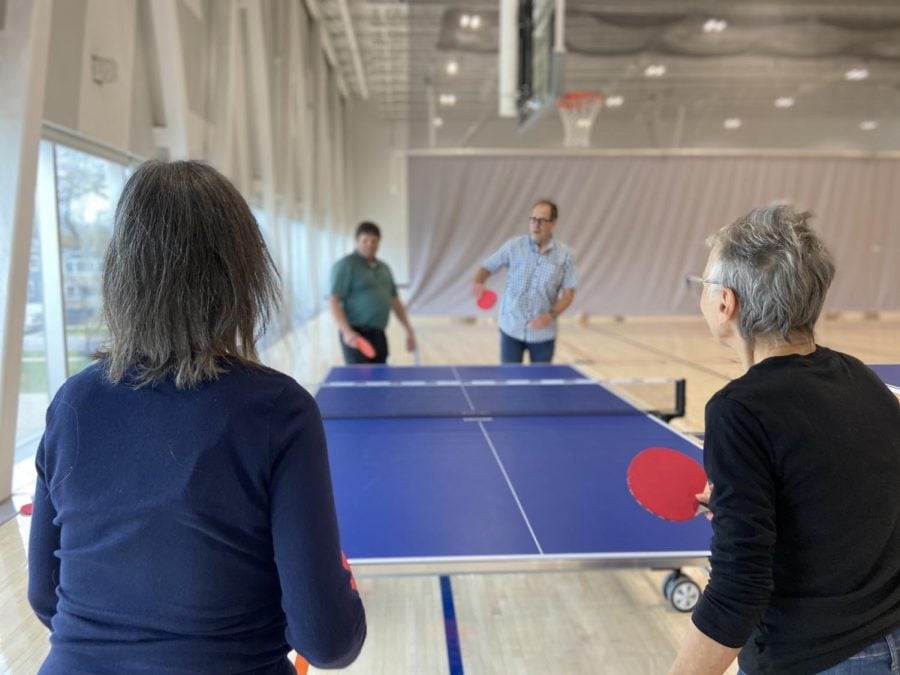Pingpong players with Parkinson’s serve up support, social ties
Cole Reynolds/The Daily Northwestern
Every Tuesday, Evanston residents with Parkinson’s Disease play pingpong at the Robert Crown Community Center.
May 2, 2023
Evanston resident Jim Young (Kellogg ‘90) stared at the little white ball in his palm, cocking his paddle.
“Game point,” he said, flicking his eyes toward his opponent.
With a short stroke, he batted the pingpong ball across the table. Two bounces later, the Tuesday afternoon match ended.
Young and a plethora of other passionate pingpong players duke it out on two tables at the Robert Crown Community Center gymnasium each Tuesday afternoon. The games are often intense, with fast-flying banter accompanying rallies and sensational shots. But this is no ordinary crew of competitors — they’re part of a group aimed for people with Parkinson’s Disease.
Preliminary research shows playing pingpong may decelerate the progression of Parkinson’s symptoms. General exercise is thought to slow the disease’s advance, but the group said pingpong provides another benefit too: community.
“The thing about pingpong is that it’s a very social sport,” Young said, chuckling at a friend who was stretching for a shot just out of reach.
It’s easy to feel isolated in the early stages of Parkinson’s, Ruth Begelman, who was diagnosed in December 2020, said. Since many people with Parkinson’s are retired, Begelman said they can go long stretches of time at home without speaking to anyone. She felt left out, she added, when her friends made plans and she was unsure if she was able to participate.
Coming to play pingpong, she said, helps her counter those feelings.
The pingpong group started two months ago, Young said. He came up with the idea when his friend Brendan Duffy sent him some research about the benefits of pingpong for those with Parkinson’s.
Duffy received his Parkinson’s diagnosis in 2014 and said he thought he’d have to give up many of his life’s plans. But about nine years later, Duffy said he’s still working and is able to do most everything.
For Duffy, who first picked up a pingpong paddle as a child, the group helps him stay active, make friends and have fun.
“You feel good during the exercise, and you feel good afterward,” Duffy said. “Sometimes when you’re doing an activity, you can move better than you could (by) just walking. Pingpong liberates your body.”
In addition to his smash shot and skill on the tables, Duffy is an avid boxer and lifts weights five days a week. He said he remains active to slow the progression of Parkinson’s, but especially enjoys the support of his new friends, whom he called “the best-looking people” around, when he is playing pingpong.
The games also offer an opportunity to “meet people you’d never know,” Young said.
That includes Sheila Meyer, who said she went out with the group for the first time on Tuesday. She was familiar with the sport, having learned to play from her brother-in-law. But she said she was hesitant to join, worried her trembling right hand would interfere with the game.
But even after several years away from pingpong, she swiftly sharpened her shooting stroke, displaying finesse with her forehand technique. Meyer said she felt empowered by hitting shots like she used to.
“I realized that I had more ability than I thought I had,” she said.
On the other hand, Begelman said she hadn’t held a paddle in 20 years before joining the group — and her skills showed it.
“I spent more time chasing the ball than hitting it,” she said, laughing. But she added that it felt good to exercise and to socialize, and she’s been coming back ever since.
Even when players hit the ball long, sometimes community members are there to help out. One child, donning a Batman cape, scampered between the tables, scooping up the ball and handing it back to Young after it fell from the table during Tuesday’s session.
Sharing the space isn’t a bad thing, Young said. Part of playing pingpong is to make people with Parkinson’s more visible to the broader community, he added.
Duffy said he encourages “everybody with Parkinson’s” in Evanston to come try their luck on the tables.
“When you’re chasing that ball, it activates you,” Duffy said. “Secondly, though, is the camaraderie — just meeting other people who have similar issues and talking to them about the solutions … everybody’s kind of in a similar spot.”
Email: [email protected]
Twitter: @charcole27
Email: [email protected]
Twitter: @jakeepste1n
Related Stories:
— NU juniors present SteadyScrib to local Parkinson’s support group
— Northwestern researchers develop milestone Parkinson’s treatment












